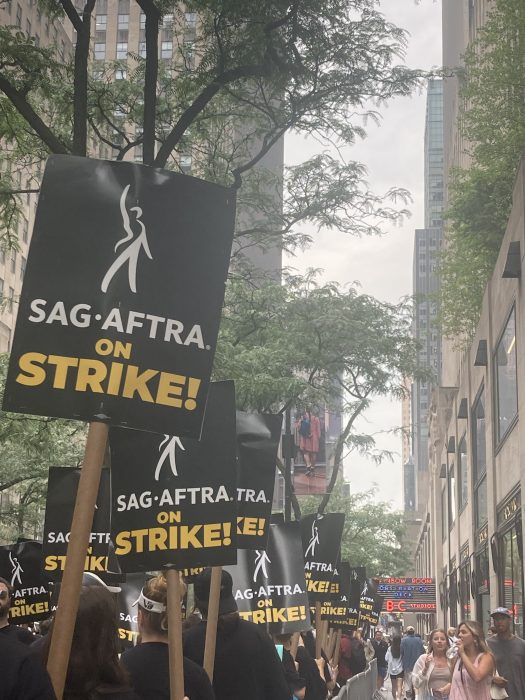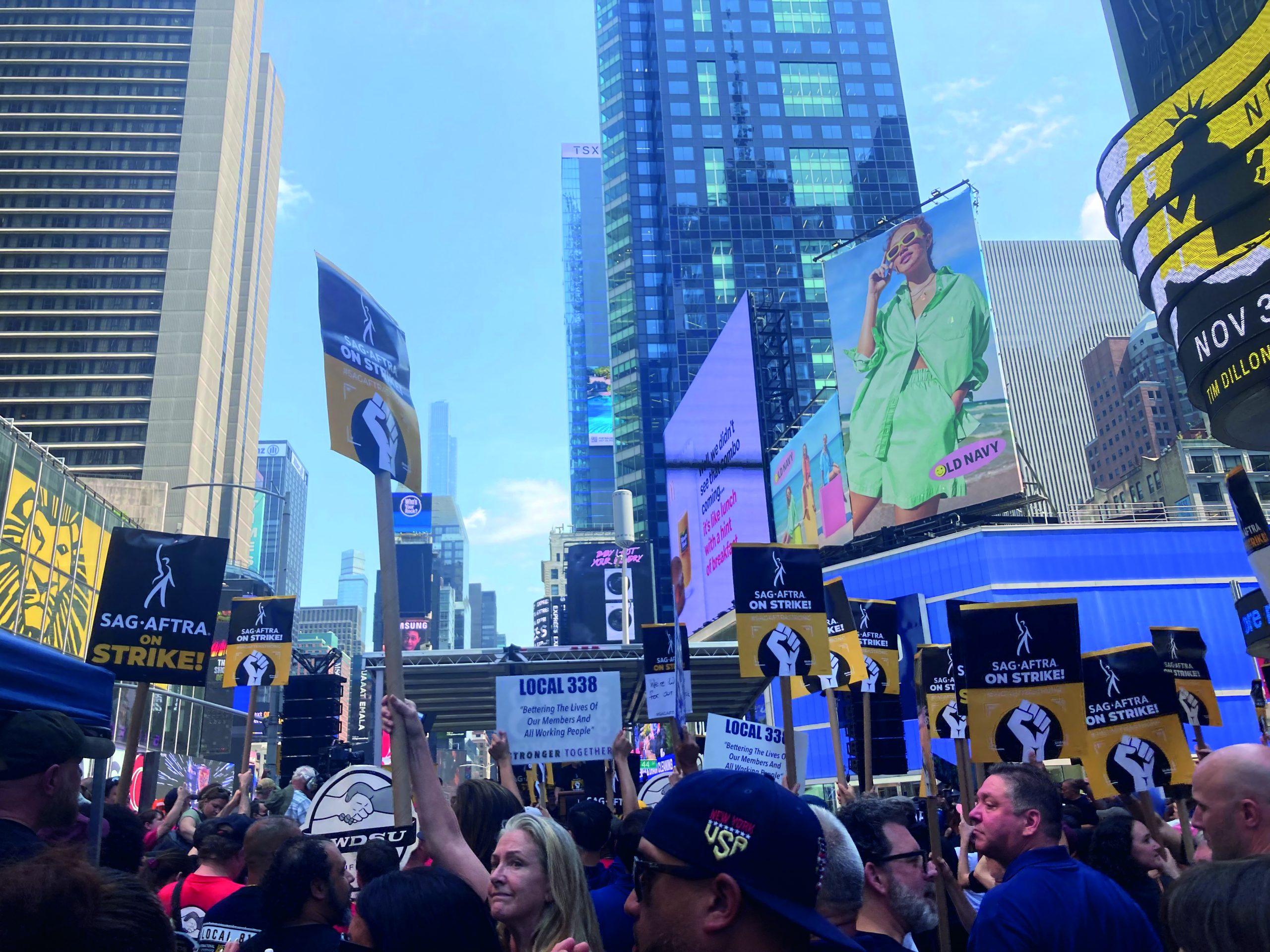“Hello fellow actors…” joked Steve Busciemi as he joined the SAG rally last month in NYC.
“Get up get down, New York is a Union Town” chanted the sea of actors, just beginning and industry icons, as they stared up at ABC’s city centre location with disdain, outrage and seething rage.
“We don’t expect you to understand who we are but we ask you to hear us and beyond that to listen to us,” yelled Bryan Cranston as he looked across the crowd that packed out Times Square.
Of course you don’t need to attend a NYC rally or an LA picket line to understand and feel the power of Hollywood’s biggest strike. As ‘Walter White’ said – “listen to us.”
Earlier this year the Writers Guild of America commenced a national strike against the big Hollywood studios that still overwork, underpay and underappreciate the writers who birth the ideas and stories fueling their industry. Two months later, the actors joined them, bringing their own sense of outrage and impassioned hope for change to the streets. Historically speaking, when the Screen Actors Guild and The Writers Guild go on strike at the same time you know it’s a big deal. During the last joint strike in 1960 future president Ronald Reagan was leading the actors as SAG president. And shortly after the first joint effort shut down the movie and tv industry, the US economy plunged into recession.
In fact, even as US movie production screeches to a halt so too does the global industry – where even across the pond in the UK or down south in Australia screen actors are unable to film, eliminating local jobs and slowing economies everywhere. And regardless of where you are, American movies and tv are watched everywhere – with local cinema and TV distributors likely to feel the absence of these ceased productions very soon. So economically speaking Hollywood strikes are clearly a big deal. But why should you care that actors with piles of money want more of it? Well true, you shouldn’t. It’s what the rich actors are trying to spotlight that really matters.

This time round the SAG Aftra strikes are fighting for a basic pay increase for the actors who aren’t celebrities yet: those hard working upcoming actors who live paycheck to paycheck auditioning and bussing tables just to one day get cast in the next big blockbuster or the next big netflix original. So when you see Florence Pugh, Margot Robbie, or the cast of Parks and Rec hanging around outside the picket lines don’t assume it’s just for the ‘gram (although sometimes it is). These industry icons remember their time out of the spotlight, and any fight for better, more equitable pay for these newbie performers is a fight for the future stars of the industry.
Furthermore, those valiantly marching strikers are not just asking for increases in the stagnated pay of the past, they are fighting for the future operations and worker rights of the movie industry. As AI and deep fake technology expands and becomes increasingly realistic, there has never been a better time to discuss, argue and yes strike for industry wide regulations on AI use in film.
With actors increasingly asked to participate in body scans and sign over their likenesses for extra pay, big studios are able to cost effectively fill screens with extras and even stars that are entirely AI generated and CGI created. Not only does this violate and endanger the work conditions of an industry of acting professionals – Yes, including the celeb cohort – it also perpetuates a world where one could watch any film with no idea if that actor is real or an increasingly realistic creation. So if you would prefer to watch the real Meryl Streep in Mamma Mia 15 instead of an AI generated one, show a little support for the strikers who just want to have a conversation about the AI future on the horizon.
And speaking of Meryl Streep, herein lies a more selfish but equally worthwhile reason to care about the Hollywood wide strike. For as long as the actors and writers are on strike the industry slows to a halt. No productions, no promotions, no new releases.
Zendaya’s sport romance Challengers has been pushed back to 2024, as has her joint Timothee Chalamet outing Dune 2. And it’s not just Zendaya affected. We will inevitably reach a point where the entire 2024-2025 film slate dries up if studios continue refusing to return to the negotiating table.
Even now we are missing out on the enjoyable promotion of current films and tv, as actors refuse to scab on the strike by promoting their projects. One such example is Only Murders In The Building, which has been unable to show off the hilarious new chemistry of Paul Rudd and Meryl Streep, who joined the cast this season, despite them both stating they were incredibly excited to do interviews. (See I told you Meryl Streep was important).
Of course, we will never know what we have or may subsequently miss out on. But that’s okay, because herein lies the biggest reason to care about the Hollywood strikes.
Not only do strikes help humanise the actors participating in them, but they equally bring stardom credibility to the efforts of ordinary strikers in other industries, such as medicine, education or ongoing rail strikes.
As the pandemic prompted social change and fights for rights across society, it is a verifiable ‘good thing’ that celebrity voices are also willing to approach the negotiating table of their industry.
There is growing hope that things can change, that the working world can become more equitable and more survivable. There is hope that pressure in any industry can create widespread change across all industries. There is hope that a strike can create meaningful change. If only the big bosses, the governments, the Hollywood studios would approach the negotiating table too.
Until then, the actors, writers and everyman workers will continue to strike, and they assuredly need your support.
